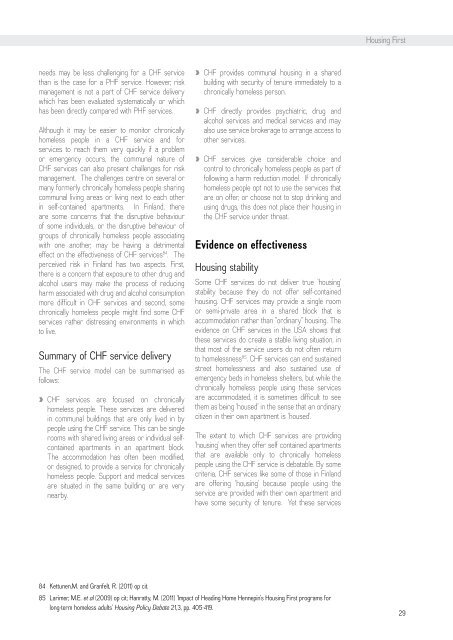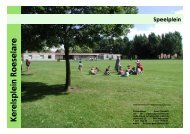Housing First - Provincie West-Vlaanderen
Housing First - Provincie West-Vlaanderen
Housing First - Provincie West-Vlaanderen
Create successful ePaper yourself
Turn your PDF publications into a flip-book with our unique Google optimized e-Paper software.
<strong>Housing</strong> <strong>First</strong>needs may be less challenging for a CHF servicethan is the case for a PHF service. However, riskmanagement is not a part of CHF service deliverywhich has been evaluated systematically or whichhas been directly compared with PHF services.Although it may be easier to monitor chronicallyhomeless people in a CHF service and forservices to reach them very quickly if a problemor emergency occurs, the communal nature ofCHF services can also present challenges for riskmanagement. The challenges centre on several ormany formerly chronically homeless people sharingcommunal living areas or living next to each otherin self-contained apartments. In Finland, thereare some concerns that the disruptive behaviourof some individuals, or the disruptive behaviour ofgroups of chronically homeless people associatingwith one another, may be having a detrimentaleffect on the effectiveness of CHF services 84 . Theperceived risk in Finland has two aspects. <strong>First</strong>,there is a concern that exposure to other drug andalcohol users may make the process of reducingharm associated with drug and alcohol consumptionmore difficult in CHF services and second, somechronically homeless people might find some CHFservices rather distressing environments in whichto live.Summary of CHF service deliveryThe CHF service model can be summarised asfollows:❱❱CHF services are focused on chronicallyhomeless people. These services are deliveredin communal buildings that are only lived in bypeople using the CHF service. This can be singlerooms with shared living areas or individual selfcontainedapartments in an apartment block.The accommodation has often been modified,or designed, to provide a service for chronicallyhomeless people. Support and medical servicesare situated in the same building or are verynearby.❱❱CHF provides communal housing in a sharedbuilding with security of tenure immediately to achronically homeless person.❱❱CHF directly provides psychiatric, drug andalcohol services and medical services and mayalso use service brokerage to arrange access toother services.❱❱CHF services give considerable choice andcontrol to chronically homeless people as part offollowing a harm reduction model. If chronicallyhomeless people opt not to use the services thatare on offer, or choose not to stop drinking andusing drugs, this does not place their housing inthe CHF service under threat.Evidence on effectiveness<strong>Housing</strong> stabilitySome CHF services do not deliver true ‘housing’stability because they do not offer self-containedhousing. CHF services may provide a single roomor semi-private area in a shared block that isaccommodation rather than “ordinary” housing. Theevidence on CHF services in the USA shows thatthese services do create a stable living situation, inthat most of the service users do not often returnto homelessness 85 . CHF services can end sustainedstreet homelessness and also sustained use ofemergency beds in homeless shelters, but while thechronically homeless people using these servicesare accommodated, it is sometimes difficult to seethem as being ‘housed’ in the sense that an ordinarycitizen in their own apartment is ‘housed’.The extent to which CHF services are providing‘housing’ when they offer self contained apartmentsthat are available only to chronically homelesspeople using the CHF service is debatable. By somecriteria, CHF services like some of those in Finlandare offering ‘housing’ because people using theservice are provided with their own apartment andhave some security of tenure. Yet these services84 Kettunen,M. and Granfelt, R. (2011) op cit.85 Larimer, M.E. et al (2009) op cit; Hanratty, M. (2011) ‘Impact of Heading Home Hennepin’s <strong>Housing</strong> <strong>First</strong> programs forlong-term homeless adults’ <strong>Housing</strong> Policy Debate 21,3, pp. 405-419.29
















